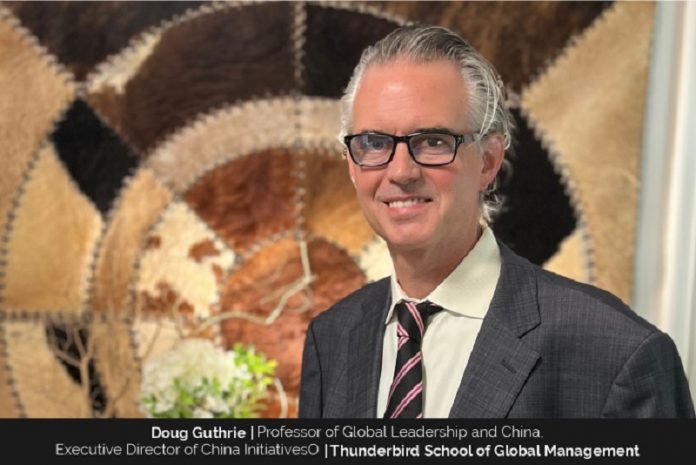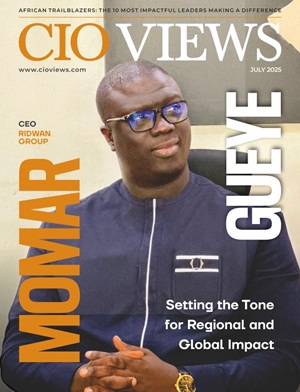
After 30 years growing his leadership presence in both academia and the corporate world, academic and author Doug Guthrie reached a pivotal moment that represented a rethinking of decades of personal and professional experience: Leadership is not the province of a select few with special gifts of charisma or intellect. Everyone has the potential to be a leader but most people simply don’t have the tools to exert that leadership. They simply need to be taught and coached around the development of those skills.
“I realized that it’s not about the position you’re in or the power you have, but rather how you influence people around you every day,” says Doug. “I call it everyday leadership, and it celebrates the basic idea is that everyone, every day, can be a leader. The leadership opportunity is there for the taking for everyone every day. It doesn’t matter if you’re an entry-level person and are wondering how you’ll get along with your company team, or if you’re a volunteer at a local food co-op or you have your own gig-economy business in your garage. There’s an opportunity for leadership in all these spaces, and the 21st century demands their leadership.”
As a Professor of Global Leadership and China, and Executive Director of China Initiatives, at the Thunderbird School of Global Management, Doug, who was trained as a China scholar, is helping educate the next generation of global corporate leaders for this new century.
And, in his executive coaching work, he’s explored how leaders of every kind should think deeply about applying their own vision to build strong organizations and cultures in order to motivate people to their highest potential – all while in service to the greater community. “We are in this together,” he says, noting that his own career journey began with an unlikely affinity for Chinese literature.
Falling in Love with China’s Language and Culture
China is an unlikely place for a Pittsburgh boy to find his passion, particularly because the country had barely come out from under the shadow of Mao when he was first introduced to its literature and history his freshman year of college. Maybe it was the exotic nature of China and its forbidden qualities that drew him.
His flirtation with China began with its language, literature, and culture. He was aided in this romance by an audio-graphic memory, which had developed in response to a hidden struggle with dyslexia as he was growing up. If he heard something once, he could easily memorize it and recall it later. As a pictographic and tonal language, Chinese was perfect for his brain to memorize the characters and stroke order with ease.
“I didn’t have a problem reading Chinese characters,” said Doug. “If the characters get reversed in your mind, it doesn’t matter, because the sentence has the same meaning. People with this learning disability often develop tactics, and I had an audiographic memory. It was very easy for me to hear something, memorize it, and reproduce it. Perfect for a tonal language. It was the first time I found something academic that I was really good at. So, I fell in love with the language and learning it.”
He was also drawn to the language’s linguistic structure where characters were presented as concepts. They are not fixed parts of speech the way English words are they have normative values with conceptual links among them. The language lends itself to poetry. Tang Dynasty Poetry, in particular, would become Doug’s obsession as an undergraduate. “When I coupled this completely foreign structure with the history of China’s ancient civilization, it felt like I was unlocking an entirely new world.”
Eight months after he unlocked this new world, and in the spring of his sophomore year, some 100,000 students marched to Tiananmen Square in Beijing. Within a week, the student occupation rose to nearly a million, as protesters demonstrated in the square for democracy and political reforms.
Doug borrowed $1,500 from his grandparents and left school to spend the next year studying language in China. But geopolitics got in the way, and his plans to spend the year in Beijing were thwarted. After the tragic ending in Tiananmen on June 3-4, 1989, China put up some very high boundaries for foreigners, and he ended up studying in Taiwan and had a magical year there.
When Doug came back to Chicago, he wanted to be a Chinese language literature and history major. He had a very successful undergraduate career as a young China scholar, but, preparing for graduate school, he realized that he didn’t just want to be a history guy. He still had to get back to the Tiananmen Movement and understand how China was changing. So, he got a Ph.D. in sociology to study China’s economic and political transformation from a sociological lens, and that was the first year that he lived in China and spent time in Shanghai, studying the transformation of Chinese factories.
Even at that early stage, Doug studied foreign investment in China and how to navigate the Chinese market. He parlayed those experiences into consulting jobs and advisory work that allowed him to advise companies and coach CEOs on how to navigate the Chinese landscape. While that kind of coaching was much more geopolitical than what Doug mainly does today, serving as a trusted counsellor has always been a part of his work with the corporate community.
Switching Gears
When Doug returned to graduate school, his entrepreneurial drive redirected his academic interests, and he sought to find a new arena to have impact. He embraced the world of leadership development, sought out opportunities to learn about leadership and soon was training the next generation of business students how to be better leaders at Harvard Business School, Columbia University Business School, New York University’s Stern School of Business, George Washing University’s School of Business, and INSEAD.
As his approach to teaching leadership evolved, he realized that it wasn’t about coaching charismatic people to become charismatic leaders. He realized that corporate executives are important to the success of a company, but the true drivers of success are the people who operate below the C-Suite. By focusing on what he calls “everyday leaders,” he is able to inspire everyone inside the organization to reach their fullest potential as leaders.
With his appointment as Dean of the George Washington University School of Business, Doug was considered a “new voice” in the business world, having not acquired an MBA in his educational background and having a leadership rather than finance focus. As he continued building his leadership development portfolio, he also spent time in China building institutional relationships that would help the university in his role as Vice President for China Operations.
Even as his ideas were winning adherents more broadly, Doug was facing his first serious leadership challenge. Three years after being named Dean, and even though he felt like he was making important, forward-looking changes in the organization, he was very publicly fired. “It was very painful at the time, but as a leader, it was a blessing, because it helped me understand what good leadership is, what it means to be a good leader, and what it means to be better at listening to the people around you,” he admits.
Doug learned that just because you achieve a leadership position doesn’t mean you’re a good leader. You still have to learn how to lead, and that means listening, vulnerability, and caring about the people around you. “Somewhat ironically, I felt like I emerged as a leader when I got fired because it was a wake-up call for me. Leadership is not simply about having a vision and having the power to tell people what to do. It’s actually about how you treat people around you and motivate them to follow your vision,” he observes.
“Leadership is hard, and my greatest achievement as a leader was enduring those difficult moments, taking a step back, continuing to hang in there, and pushing myself to learn from the experiences and take on the difficulties of leadership. What do I need to learn from this experience to be a better leader and a better person?” he adds.
After he got a call from the Apple Inc. leadership to become the leading faculty member for Apple University in China, Doug realized that to be effective in that role, he had to be a better listener, build more cohesive teams and coalitions, develop a clearer understanding of the organization’s goals, and bring people along with his vision.
Doug notes that Apple is very interested in its organizational culture and one of his challenges during his time there was trying to focus leadership development and engagement at its mid-level people.
“My boss, the Dean of Apple University, and some other people in the organization thought I should focus more on teaching and coaching the leadership in China,” he recalls. “My answer was that all the mid-level people who were good at their jobs were going to be leaders, and we had to help them figure out how to lead. Leading isn’t just about a strategy or vision, but also about building a healthy organizational and team culture, motivating people, being introspective and getting to know oneself.”
At Apple, Doug was much more of a team player and much better able to focus on what the organization needed in China. Doug had long been a fan of China’s economic development and transformation, having spent decades following China’s long transformation from economic backwater to global powerhouse. Yet, Doug also was confronting and experiencing a new China, a China administered by President Xi Jinping, who had his own vision for China’s future and one that was quite different than previous Chinese leaders.
“I feel I was able to have a significant impact on the places I’ve been, and I’m happy and proud of it. At Apple, I worked in leadership development and building a strong organizational culture, but also helped the organization understand the complexities that were going on in China at the time,” he says.
Returning to Academia
When Doug returned to the United States in 2019 after leaving Apple, he decided to go back into academia, to be a professor, and use what he had learned to help train business leaders and offer insights to executives in strategic and organizational development thinking.
In the early days of the pandemic, the Thunderbird School of Global Management invited him to become a professor. “Thunderbird is just such a special place in the business school world,” says Doug. “It was founded post World War II based on the thinking that we have these conflicts because we’re not teaching and training people to understand cross-cultural issues enough. Over the years, it has become a global leader in the study and teaching of global management, global trade and innovation. It is just a special place in the business school world. The Dean was also interested in my knowledge about China and, as the executive director of China initiatives, I helped the school think through its China initiatives.”
Thunderbird does not offer MBA degrees, but a Master’s and an Executive Master’s of Global Management. It emphasizes the idea that good leadership is not just about knowing your numbers and figuring out how organizations work, but about understanding a cross-cultural world.
Meanwhile, Doug formed On Global Leadership, an entrepreneurial platform with a blog and podcasts, to offer thought leadership about the complexities of navigating the global geopolitical system, particularly operating in and around China. The organization also focuses on teaching and coaching leadership development.
As On Global Leadership grew in stature, Doug became a voice for not just coaching and advisory work on the strategic side, but also on the leadership development side. He now focuses on executive coaching and helps leaders bring together the vision and the strategy, build a healthy team, motivate people, and help them rise to higher positions and higher performance in organizations.
Doug soon received a call from Marshall Goldsmith’s 100 Coaches and was asked to join its ranks. “They bring executive coaches together, so it seemed like a wonderful transition. I still do the China strategic advisory work, but I also like to help executives think about their own careers, grow into their roles and demanding positions, grow their teams, and be inspiring leaders,” he says, noting that one-on-one coaching is very enriching for him and he enjoys those coaching relationships.
Doug points out that the world is complex and diverse, and it is important for leaders to have the resilience necessary to survive the complexity. He recalls that during a leadership coaching event for ViaPath, which provides services for incarcerated individuals and returning citizens who have been released from long-term prison sentences, he realized that he had little in common with the men and women he was hoping to coach.
“When I engaged with some returning citizens who could speak the language and talk about experiences, it made the educational experience completely different. The coaching is dramatically better when we think about diversity and inclusion,” he insists. Doug is now working on a book about returning citizens and their everyday leadership.
Sharing The Concept Of Everyday Leadership
In the past as a Dean, Doug believed that success was the grand vision of leading an organization into the future, elevating vision and strategy, raising the right resources, and getting people motivated. Today, he thinks of leadership as being built around purpose, helping to improve the people around you and the organization you’re a part of.
“It’s less about achieving a marker or goal and more about helping to make the people around you better and more successful, and helping the organization to be more successful,” he explains. “In my leadership coaching, I aspire to always be very open and vulnerable. Good leadership isn’t about being the most visionary, fastest-thinking, most creative person in the room. It is about recognizing the people around you, listening, being vulnerable, connecting to people, and building the team and culture to drive the success of the organization. I try to model that approach in my teaching and coaching.”
Doug also has a soft advisory position advising the Dean’s Thunderbird management team on economic development and programmatic things they can do in China. He helped establish Thunderbird’s partnership with the Zhejiang International Business School and continues to support that collaboration. He also helped to develop and teaches in an International Management program for Chinese students.
Doug recently, with Dr. Mark Goulston and David Slocum, co-founded the Deeper Coaching Institute (DCI) as part of On Global Leadership, which is not just about coaching and advisory work, but also about pushing people to think in a deeper way about who they are and how they shape a room as a leader because their behavior influences the culture of the organization and the healthy career development of the people they work with.
Good Leaders Pay Attention
Doug observes that the high-pressure, high-stakes world we live in can be really hard and being a better leader means paying attention to the people around you and taking care of them. A few years ago, he was diagnosed with bipolar II disorder, which is often not recognized because it doesn’t present with hyper manic fits, but as hypomania. “You end up working really hard, and I did, and it served me well. But the swings of hypomania and depression also came when I was at GW and Apple, and I didn’t understand what was happening or how to deal with it,” he shares.
Doug candidly talks about his challenges because he believes that really good leaders understand how to build an effective organization and culture, while also shepherding support for diversity, inclusion, and mental health. “It’s not just a question of whether people are getting their jobs done. It’s whether they’re okay. The high-stakes, high-pressure world we live in can lead to struggles and good leaders pay attention,” he insists.
Doug recalls that when he was in his hypomanic state and focused on work and leading the organization, it didn’t make him a very good parent or partner. He had to learn to prioritize those things. “We have people in our lives that count on us and love us, and we need to be present for them. If at this stage in my life striking that balance means I write fewer articles or take on fewer coaching clients or sleep a little more, so I can be present for my wonderful kids, it’s got to happen,” he says.
Doug brings this back to his leadership teaching and coaching process to help leaders understand that they’re not giving up their ambitions to be a good parent, even if it means career success might be a little longer in coming. “You might be a better servant leader when you think about how to do that, so I try to not just talk the talk but also live it,” he says. “I hope that, through my teaching, coaching, and writing, I’m getting that message out.”
Doug’s career challenges have led him to be a different kind of leader, leadership teacher, and coach. He wholly believes in the servant leadership approach, and that leadership is about making the people around you better and helping them achieve what they want to, thereby making the organization better.
“We often think about leadership as being a position that solidifies your power and ability to tell people what to do and guide the organization where you want to. It’s important to have a vision. But, at this point in my life, I believe in the idea of the servant leader. Even if you don’t end up getting credit for everything, you’ve contributed to the success of your organization. If you’ve helped the people around you and made the organization, you’re working with a little bit better, you’ve been a good leader.”
Contact information:




















